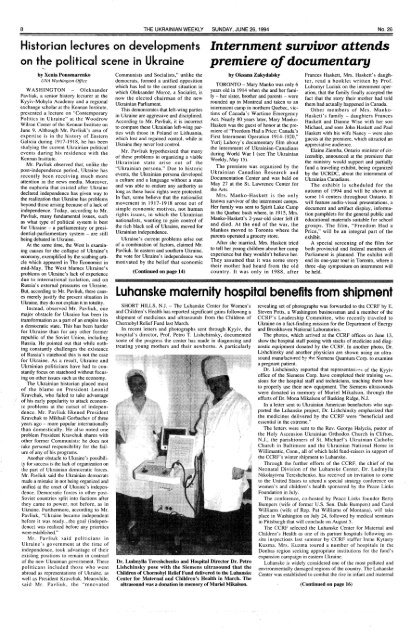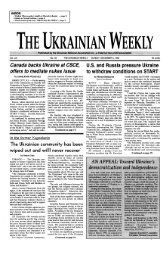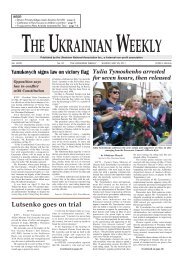The Ukrainian Weekly 1994
The Ukrainian Weekly 1994
The Ukrainian Weekly 1994
You also want an ePaper? Increase the reach of your titles
YUMPU automatically turns print PDFs into web optimized ePapers that Google loves.
8 THE UKRAINIAN WEEKLY SUNDAY, JUNE 26,<strong>1994</strong> No. 26<br />
Historian lectures on developments internment survivor attends<br />
on the political scene in Ukraine premiere of documentary<br />
by Хеша Ponomarenko<br />
UNA Washington Office<br />
WASHINGTON - oieksander<br />
Pavliuk, a senior history lecturer at the<br />
Kyyiv-Mohyla Academy and a regional<br />
exchange scholar at the Kennan institute,<br />
presented a lecture on "Contemporary<br />
Politics in Ukraine" at the Woodrow<br />
Wilson Center of the Kennan institute on<br />
June 9. Although Mr. Pavliuk's area of<br />
expertise is in the history of Eastern<br />
Galicia during 1917-1918, he has been<br />
studying the current <strong>Ukrainian</strong> political<br />
events during his residence with the<br />
Kennan institute.<br />
Mr. Pavliuk observed that, unlike the<br />
post-independence period, Ukraine has<br />
recently been receiving much more<br />
attention in the news media. Moreover,<br />
the euphoria that existed after Ukraine<br />
declared independence has given way to<br />
the realization that Ukraine has problems<br />
beyond those arising because of a lack of<br />
independence. Today, according to Mr.<br />
Pavliuk, many fundamental issues, such<br />
as what type of political system is. best<br />
for Ukraine - a parliamentary or presi–<br />
dential-parliamentary system - are still<br />
being debated in Ukraine.<br />
At the same time, the West is examin–<br />
ing causes for the collapse of Ukraine's<br />
economy, exemplified by the scathing arti–<br />
cle which appeared in <strong>The</strong> Economist in<br />
mid-May. <strong>The</strong> West blames Ukraine's<br />
problems on Ukraine's lack of experience<br />
due to international isolation, and on<br />
Russia's external pressures on Ukraine.<br />
But, according to Mr. Pavliuk, these caus–<br />
es merely justify the present situation in<br />
Ukraine, they do not explain it in totality.<br />
instead, observed Mr. Pavliuk, one<br />
major obstacle for Ukraine has been its<br />
transformation as a part of an empire into<br />
a democratic state. This has been harder<br />
for Ukraine than for any other former<br />
republic of the Soviet Union, including<br />
Russia. He pointed out that while noth–<br />
ing constantly challenges the existence<br />
of Russia's statehood this is not the case<br />
for Ukraine. As a result, Ukraine and<br />
<strong>Ukrainian</strong> politicians have had to con–<br />
stantly focus on statehood without focus–<br />
ing on other issues such as the economy.<br />
<strong>The</strong> <strong>Ukrainian</strong> historian placed most<br />
of the blame on President Leonid<br />
Kravchuk, who failed to take advantage<br />
of his early popularity to attack econom–<br />
ic problems at the outset of indepen–<br />
dence. Mr. Pavliuk likened President<br />
Kravchuk to Mikhail Gorbachev of three<br />
years ago - more popular internationally<br />
than domestically. He also noted one<br />
problem President Kravchuk shares with<br />
other former Communists: he does not<br />
take personal responsibility for the fail–<br />
ure of any of his programs.<br />
Another obstacle to Ukraine's possibili–<br />
ty for success is the lack of organization on<br />
the part of <strong>Ukrainian</strong> democratic forces.<br />
Mr. Pavliuk said the <strong>Ukrainian</strong> democrats<br />
made a mistake in not being organized and<br />
unified at the onset of Ukraine's indepen–<br />
dence. Democratic forces in other post-<br />
Soviet countries split into factions after<br />
they came to power, not before, as in<br />
Ukraine. Furthermore, according to Mr.<br />
Pavliuk, "Ukraine became independent<br />
before it was ready...the goal (indepen–<br />
dence) was realized before any priorities<br />
were established."<br />
Mr. Pavliuk said politicians in<br />
Ukraine's government at the time of<br />
independence, took advantage of their<br />
existing positions to remain in contraol<br />
of the new <strong>Ukrainian</strong> government. <strong>The</strong>se<br />
politicans included those who went<br />
abroad as representations of Ukraine, as<br />
well as President Kravchuk. Meanwhile,<br />
said Mr. Pavliuk, the "renovated<br />
Communists and Socialists," unlike the<br />
democrats, formed a unified opposition<br />
which has led to the current situation in<br />
which Oieksander Moroz, a Socialist, is<br />
now the elected chairman of the new<br />
<strong>Ukrainian</strong> Parliament.<br />
This demonstrates that left-wing parties<br />
in Ukraine are aggressive and disciplined.<br />
According to Mr. Pavliuk, it is incorrect<br />
to compare these <strong>Ukrainian</strong> left-wing parties<br />
with those in Poland or Lithuania,<br />
which lost and regained control, while in<br />
Ukraine they never lost control.<br />
Mr. Pavliuk hypothesized that many<br />
of these problems in organizing a viable<br />
<strong>Ukrainian</strong> state arise out of the<br />
"<strong>Ukrainian</strong> persona." Due to historic<br />
events, the <strong>Ukrainian</strong> persona developed<br />
a culture and a language without a state<br />
and was able to endure any authority as<br />
long as these basic rights were protected,<br />
in fact, some believe that the nationalist<br />
movement in 1917-1918 arose out of<br />
simple economic motives, not human<br />
rights issues, in which the <strong>Ukrainian</strong><br />
nationalists, wanting to gain control of<br />
the rich black soil of Ukraine, moved for<br />
<strong>Ukrainian</strong> independence.<br />
Ukraine's current problems arise out<br />
of a combination of factors, claimed Mr.<br />
Pavliuk. in eastern and southern Ukraine,<br />
the vote for Ukraine's independence was<br />
motivated by the belief that economic<br />
(Continued on page 14)<br />
Luhanske maternity hospi<br />
SHORT H1LLS, N.J. - <strong>The</strong> Luhanske Center for Women's<br />
and Children's Health has reported significant gains following a<br />
shipment of medicines and ultrasounds from the Children of<br />
Chornobyl Relief Fund last March.<br />
in recent letters and photographs sent through Kyyiv, the<br />
hospital's director, Prof. Petro T. Lishchinsky, documented<br />
some of the progress the center has made in diagnosing and<br />
treating young mothers and their newborns. A particularly<br />
Dr. Ludmylla Tereshchenko and Hospital Director Dr. Petro<br />
Lishchinsky pose with the Siemens ultrasound that the<br />
Children of Chornobyl Relief Fund delivered to the Luhanske<br />
Center for Maternal and Children's Health in March. <strong>The</strong><br />
ultrasound was a donation in memory of Muriel Mikalson.<br />
by Oksana Zakydalsky<br />
TORONTO - Mary Manko was only 6<br />
years old in 1914 when she and her fami–<br />
ly - her sister, brother and parents - were<br />
rounded up in Montreal and taken to an<br />
internment camp in northern Quebec, vic–<br />
tims of Canada's Wartime Emergency<br />
Act. Nearly 80 years later, Mary Manko–<br />
Haskett was the guest of honor at the pre–<br />
miere of "Freedom Had a Price: Canada's<br />
First internment Operation 1914-1920,"<br />
Yurij Luhovy's documentary film about<br />
the internment of <strong>Ukrainian</strong>-Canadians<br />
during World War 1 (see <strong>The</strong> <strong>Ukrainian</strong><br />
<strong>Weekly</strong>, May 15).<br />
<strong>The</strong> premiere was organized by the<br />
<strong>Ukrainian</strong> Canadian Research and<br />
Documentation Center and was held on<br />
May 27 at the St. Lawrence Center for<br />
the Arts.<br />
Mrs. Manko-Haskett is the only<br />
known survivor of the internment camps.<br />
Her family was sent to Spirit Lake Camp<br />
in the Quebec bush where, in 1915, Mrs.<br />
Manko-Haskett's 2-year-old sister fell ill<br />
and died. At the end of the war, the<br />
Mankos moved to Toronto where the<br />
parents operated a grocery store.<br />
After she married, Mrs. Haskett tried<br />
to tell her young children about her camp<br />
experience but they wouldn't believe her.<br />
<strong>The</strong>y assumed that it was some story<br />
their mother had heard from the old<br />
country, it was only in 1988, after<br />
Frances Haskett, Mrs. Haskett's daugh–<br />
ter, read a booklet written by Prof.<br />
Lubomyr Luciuk on the internment oper–<br />
ation, that the family finally accepted the<br />
fact that the story their mother had told<br />
them had actually happened in Canada.<br />
Other members of Mrs. Manko-<br />
Haskett's family - daughters Frances<br />
Haskett and Dianne Wise with her son<br />
Michael, and sons John Haskett and Paul<br />
Haskett with his wife Nancy - were also<br />
guests at the premiere, which attracted an<br />
appreciative audience.<br />
Elaine Ziemba, Ontario minister of cit–<br />
izenship, announced at the premiere that<br />
the ministry would support and partially<br />
fund a traveling exhibit, being organized<br />
by the UCRDC, about the internment of<br />
<strong>Ukrainian</strong> Canadians.<br />
<strong>The</strong> exhibit is scheduled for the<br />
autumn of <strong>1994</strong> and will be shown at<br />
some 14 centers throughout Ontario, it<br />
will feature audio-visual presentations, a<br />
document and artifact display, informa–<br />
tion pamphlets for the general public and<br />
educational materials suitable for school<br />
groups. <strong>The</strong> film, "Freedom Had a<br />
Price," will be an integral part of the<br />
exhibit.<br />
A special screening of the film for<br />
both provincial and federal members of<br />
Parliament is planned. <strong>The</strong> exhibit will<br />
end its one-year tour in Toronto, where a<br />
three -day symposium on internment will<br />
be held.<br />
al benefits from shipment<br />
revealing set of photographs was forwarded to the CCRF by E.<br />
Steven Potts, a Washington businessman and a member of the<br />
CCRF's Leadership Committee, who recently traveled to<br />
Ukraine on a fact-finding mission for the Department of Energy<br />
and Brookhaven National Laboratories.<br />
<strong>The</strong> photos, which arrived at the CCRF offices on June 13,<br />
show the hospital staff posing with stacks of medicine and diag–<br />
nostic equipment donated by the CCRF. in another photo, Dr.<br />
Lishchinsky and another physician are shown using an ultrasound<br />
manufactured by the Siemens Quantum Corp. to examine<br />
a pregnant patient.<br />
Dr. Lishchinsky reported that representatives of the Kyyiv<br />
office of the Siemens Corp. have completed their training ses–<br />
sions for the hospital staff and technicians, teaching them how<br />
to properly use their new equipment. <strong>The</strong> Siemens ultrasounds<br />
were donated in memory of Muriel Mikalson, through the<br />
efforts of Dr. Mona Mikalson of Basking Ridge, N.J.<br />
in a letter sent to <strong>Ukrainian</strong> American benefactors who supported<br />
the Luhanske project, Dr. Lishchinsky emphasized that<br />
the medicines delivered by the CCRF were "beneficial and<br />
essential in the extreme."<br />
<strong>The</strong> letters were sent to the Rev. George Halycia, pastor of<br />
the Holy Ascension <strong>Ukrainian</strong> Orthodox Church in Clifton,<br />
N.J., the parishioners of St. Michael's <strong>Ukrainian</strong> Catholic<br />
Church in Baltimore and the <strong>Ukrainian</strong> National Home in<br />
Willimantic, Conn., all of which held fund-raisers in support of<br />
the CCRF's winter shipment to Luhanske.<br />
Through the further efforts of the CCRF, the chief of the<br />
Neonatal Division of the Luhanske Center, Dr. Ludmylla<br />
Nikolayivna Tereshchenko, has received an invitation to come<br />
to the United States to attend a special strategy conference on<br />
women's and children's health sponsored by the Peace Links<br />
Foundation in July.<br />
<strong>The</strong> conference, co-hosted by Peace Links founder Betty<br />
Bumpers (wife of former U.S. Sen. Dale Bumpers) and Carol<br />
Williams (wife of Rep. Pat Williams of Montana), will take<br />
place in Washington on July 24, followed by medical seminars<br />
in Pittsburgh that will conclude on August 5.<br />
<strong>The</strong> CCRF selected the Luhanske Center for Maternal and<br />
Children's Health as one of its partner hospitals following on–<br />
site inspections last summer by CCRF staffer irene Kytasty<br />
Kuzma. Mrs. Kuzma toured a number of hospitals in the<br />
Donbas region seeking appropriate institutions for the fund's<br />
expansion campaign in eastern Ukraine.<br />
Luhanske is widely considered one of the most polluted and<br />
environmentally damaged regions of the country. <strong>The</strong> Luhanske<br />
Center was established to combat the rise in infant and maternal<br />
(Continued on page 16)

















